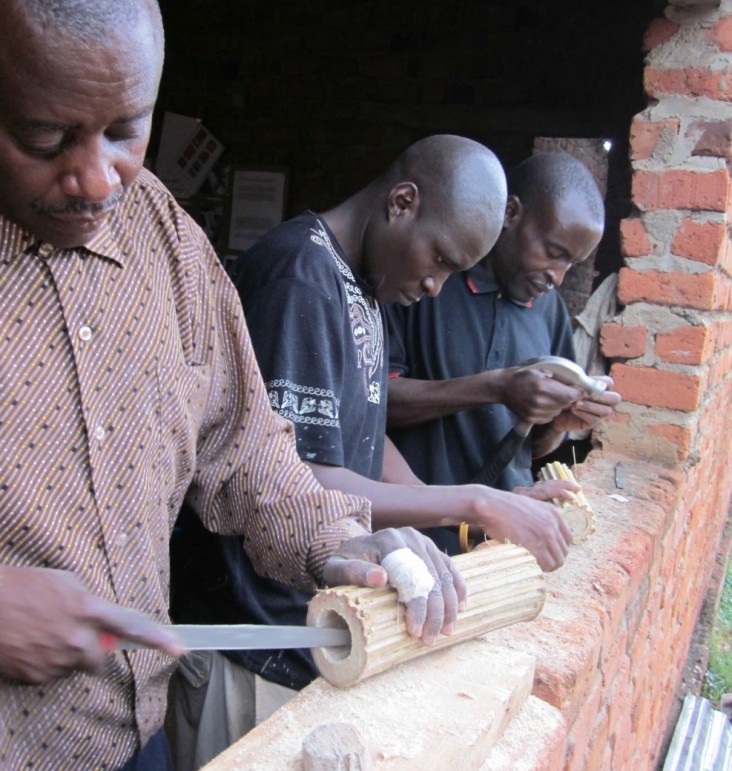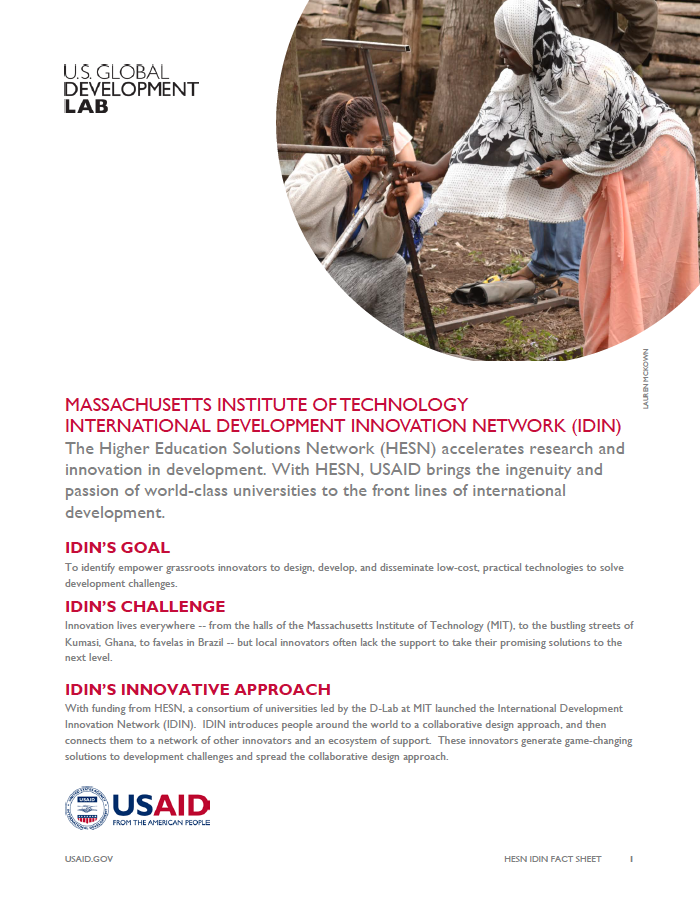- What We Do
- Agriculture and Food Security
- Democracy, Human Rights and Governance
- Economic Growth and Trade
- Education
- Ending Extreme Poverty
- Environment and Global Climate Change
- Gender Equality and Women's Empowerment
- Global Health
- Water and Sanitation
- Working in Crises and Conflict
- U.S. Global Development Lab

IDIN's Goal
To identify empower grassroots innovators to design, develop, and disseminate low-cost, practical technologies to solve development challenges.
IDIN's Challenge
Innovation lives everywhere -- from the halls of the Massachusetts Institute of Technology (MIT), to the bustling streets of Kumasi, Ghana, to favelas in Brazil -- but local innovators often lack the support to take their promising solutions to the next level.
IDIN's Innovative Approach
With funding from HESN, a consortium of universities led by the D-Lab at MIT launched the International Development Innovation Network (IDIN). IDIN introduces people around the world to a collaborative design approach, and then connects them to a network of other innovators and an ecosystem of support. These innovators generate game-changing solutions to development challenges and spread the collaborative design approach.
Design Summits
When IDIN holds an International Development Design Summit, teams of local innovators work with communities in order to identify and co-create solutions to local challenges. A summit provides intensive hands-on experience in collaboratively designing low-cost, practical technologies to alleviate poverty. The best ideas are supported for possible wide-scale application.
The Network
There are more than 660 IDIN Network members in 62 countries around the world. With the belief that diversity is a key ingredient for innovation, IDIN innovators come together from a variety of disciplines, sectors, and worldviews with varying levels of formal education.
IDIN helps its Network members move promising solutions forward with a support network, including funding, mentorship, technical assistance, access to innovation centers, communications tools, and more. IDIN actively fosters and supports 87 technologies and ventures including:
- Afya Poa, a partnership to provide health insurance coverage for more than 2,000 informal workers in Kenya through daily micropayments.
- Zasaka, an agricultural venture that improves yields, eliminates post-harvest loss, and empowers farmers to eliminate seasonal hunger by using better grain storage solutions. Zasaka has now reached over 2,600 farmers in Zambia.
- PoupaCerto, a pilot mobile application to help low-income households, especially those without bank accounts, track and accomplish financial goals in Brazil.
Innovation Centers
IDIN innovation centers are maker spaces for innovators looking to make a social impact in their community and beyond. Innovation centers connect Network members with resources and training to develop low-cost, practical technologies to alleviate poverty. Innovation centers offer access to workshop space and tools, educational programs, and a marketplace for buying, selling, and trading technologies created by local innovators. Centers are up and running in Brazil, Tanzania, Uganda, Zambia, India, Kenya, Sierra Leone, and Nepal. To date, local innovators have leveraged these centers to develop over a dozen innovations, including a drip irrigation kit, a solar water heater, and a local Internet venture.
Research
IDIN’s research program explores the role of local innovation and grassroots problem solving in improving community wellbeing and addressing development challenges associated with poverty. IDIN seeks to increase understanding of how local innovation works and how innovation processes and ecosystems can be described, mapped, and analyzed. IDIN also investigates the development impacts of local innovation to understand how and why local innovation matters. IDIN’s research explores the role that global networks play in enabling local innovation and spreading the impact of local solutions and approaches.
Some of IDIN’s current research projects include developing a quantitative tool called a “Local Innovation Index” to assess the levels and types of local innovation in a specific community, country, or region, as well as generating methods for identifying and mapping local innovation systems. IDIN also spearheads the Lean Research initiative, based at MIT, which asserts that research on global development should be respectful, relevant, rigorous, and right-sized.
Student Participation
IDIN engages undergraduate and graduate students in the United States and developing countries, providing opportunities for student-driven projects, research, field visits, and technology development that support local innovation and impact. IDIN engages students in all its activities through classes, research assistantships, fellowships, and practica.
Partners
MIT D-Lab, Olin College of Engineering, Colorado State University, University of California Davis, Singapore Polytechnic University Singapore, Kwame Nkrumah University of Science & Technology in Ghana, the National Technology Business Centre in Zambia, ECHO East Africa Impact Center in Tanzania, AISE Innovation Centre in Tanzania, Vila Nova Esperanca innovation center in Brazil, and the Tet Centre innovation center in Uganda.
For more information
https://twitter.com/dlab_mit • http://www.idin.org/
The Higher Education Solutions Network (HESN) accelerates research and innovation in development. With HESN, USAID brings the ingenuity and passion of world-class universities to the front lines of international development. Since 2012, HESN has supported Development Labs at seven universities that engage students, researchers, faculty, and their partners in innovating scientific and technological approaches to the world's most challenging development problems. By evaluating and field-testing approaches in partnership with local institutions, HESN Development Labs identify solutions that are efficient, cost-effective, accessible, and sustainable, then strategize how to apply them on a large scale. With funding over five years from USAID and matching investments from the universities, the HESN network has grown into a vibrant collaboration among more than 650 partner institutions in academia, civil society, and government in more than 65 countries.








Comment
Make a general inquiry or suggest an improvement.